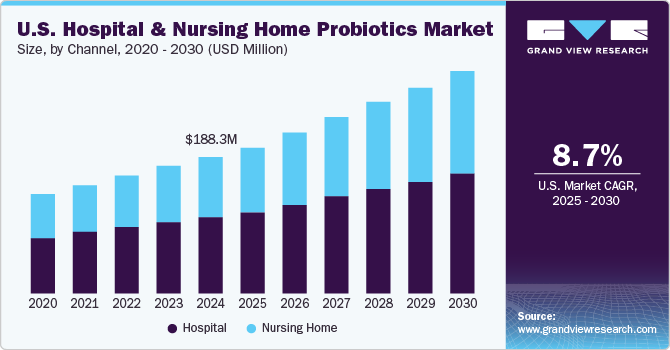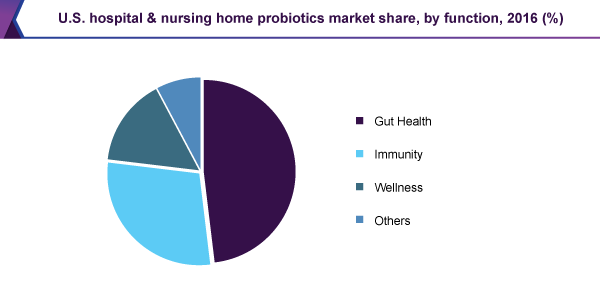- Home
- »
- Nutraceuticals & Functional Foods
- »
-
U.S. Hospital & Nursing Home Probiotics Market, Industry Report, 2025GVR Report cover
![U.S. Hospital and Nursing Home Probiotics Market Size, Share & Trends Report]()
U.S. Hospital and Nursing Home Probiotics Market Size, Share & Trends Analysis Report By Channel (Hospitals, Nursing Homes), By Function (Gut Health, Immunity, Wellness), And Segment Forecasts, 2018 - 2025
- Report ID: GVR-2-68038-119-1
- Number of Pages: 112
- Format: Electronic (PDF)
- Historical Range: 2014 - 2015
- Industry: Consumer Goods
Industry Insights
The U.S. hospital & nursing home probiotics market size was valued at USD 92.4 million in 2016 and is projected to expand at an estimated CAGR of 9.3% from 2017 to 2025. The shift in consumer preference toward a healthier lifestyle and consequent rise in demand for preventive healthcare are anticipated to drive the U.S. market.
Innovative supplements are gaining popularity across the country owing to rising awareness regarding nutritional products. Probiotics and supplements are widely utilized to improve gut health, immunity, and overall wellness. Studies focused on uncovering the potential of probiotics and supplements are projected to help develop a wide scope for novel applications, thereby boosting the growth potential of the market.

According to the World Health Organization (WHO), 8.1 million children below the age of five died in 2013, of which 14.0% of deaths occurred due to diarrhea. Even if it does not lead to mortality, persistent diarrhea can elicit major long-term problems in infants, affecting nutrition, growth, and cognition. In 2017, among 20 developed nations, the U.S. reported the worst child mortality rate. Rising concerns regarding child mortality rate are forcing policymakers to promote the use of probiotics and supplements in nursing homes and hospitals.
The use of probiotics results in substantial cost savings for hospitals due to a reduction in various hidden costs. For institutions such as hospitals and nursing homes, reliability, and brand value are some of the most important factors for achieving a larger market share. Indirect benefits of using probiotics products allow healthcare institutions to enhance their brand image by making the hospital stay more comfortable and shorter for patients. The use of probiotics thus provides benefits to doctors, hospitals, medical staff, and patients alike.
A combination of a Letter of Medical Necessity (LMN) and a Health Reimbursement Arrangement (HRA), Health Savings Account (HSA), or Flexible Spending Account (FSA) enables consumers to claim for medical coverage. However, probiotics are ineligible for medical reimbursement with Dependent Care Flexible Spending Accounts (DCFSA) and Limited Care Flexible Spending Accounts (LCFSA).
Channel Insights
By channel, the industry can be segmented into hospitals and nursing homes. Hospitals emerged as the largest distribution channel with a market share of more than 59.0% in 2016. In urban areas, the ease of getting a consultation from a physician is much greater than in rural areas. The ratio of patients to primary care doctors in rural regions is 39.8 doctors per 100,000 people. Uneven distribution of doctors and poor health conditions in rural areas is an opportunity for hospitals in U.S. Probiotics suppliers and manufacturers are expected to enter the rural healthcare system owing to the presence of substantial growth potential and various untapped areas.
In the U.S., several hospitals are facing operational losses, which is pushing hospital administrations to revamp their strategies. For instance, MD Anderson Cancer Center, U.S., witnessed an operational loss of USD 266 million in 2015–2016. The hospital witnessed an additional loss of USD 170 million in early 2016. Partners HealthCare, based in Boston, U.S., suffered a loss of USD 108 million on operations in 2015–2016, which was its second operating loss in the last four years.
The operating income of Cleveland Clinic also declined by 71.0% in 2015–2016. Providence St. Joseph Health, the second-largest Catholic hospital in the U.S., registered a drop of USD 512 million in operating income along with operating loss of USD 252 million in 2015–2016. Regional players such as Northwell Health, UnityPoint Health, and California’s Sutter Health also reported a sharp decline in their operating earnings in 2017.
Hospitals must reconsider their operational and marketing strategies to overcome declining revenues. Steps must also be taken to ensure that their capital investments in emerging payment plans and physician staff generate solid returns.
Nursing homes are an important distribution channel in the U.S. hospital & nursing home probiotics market. In 2016, the segment accounted for just over 40.0% of the market. The presence of untapped markets, low penetration even in urban areas, and government support to improve the standard of nursing homes are projected to boost the segment to exhibit the fastest growth rate over the forecast period.
Function Insights
Gut health emerged as the largest and fastest-growing function of probiotics and supplements in the U.S. market. Probiotics tend to ameliorate IBS, a widely prevalent chronic disease identified by bloating, abdominal pain, and frequent constipation or diarrhea.

In U.S., probiotics, and supplements are used to reduce the risk of health issues such as NEC, AAD, lactose intolerance, and common infectious diseases (CID) such as upper respiratory tract infections, atopic dermatitis, and traveler’s diarrhea. These products are also utilized in the treatment of colic and acute infectious diarrhea. A majority of the aforementioned health problems are related to gut health, which makes it the fastest-growing segment by function.
Atopic dermatitis is the most common form of eczema in the U.S. and is primarily caused by problems associated with skin barrier and malfunctioning of the human immune system. The annual economic expenditure on eczema in the country is relatively high, as it includes various direct costs such as medication and hospital visits as well as indirect costs such as the impact of the disease on a patient’s quality of life and level of productivity. Policymakers are focusing on improving the quality of life of patients, which aids the growth of probiotics and other supplements in the U.S.
Bacteria such as Bifidobacterium longum and Lactobacillus helveticus are used to reduce depression, hostility, and anger. Apart from these functions, supplements and probiotics are also used to improve problem-solving abilities. Other functions include lung, vaginal, and skincare. Probiotics are used to treat several combined immune deficiencies (CID). Growing social awareness about nutritive products and increasing health concerns arising from busy urban lifestyles are projected to drive the market in the U.S.
U.S. Hospital & Nursing Home Probiotics Market Share Insights
Probiotics are an emerging field wherein various public and private organizations are conducting research. The World Health Organization (WHO) and the Food and Agriculture Organization (FAO) have suggested only a relatively small number of diseases for which probiotics have been proven to have a remedial effect.
The strongest evidence regarding the beneficial effect of probiotics on human health has been established about B. lactis BB-12 and L. rhamnosus GG for prevention. L. reuteri SD2222 has been known to have a positive impact on acute diarrhea in children, primarily when the condition is caused by rotaviruses. The use of probiotics is a proven way to reduce the mean duration of watery diarrhea.
Several companies are engaged in partnerships and joint ventures to develop awareness about probiotic products. In January 2018, Probi, a Sweden-based probiotic B2B solution manufacturer, signed a deal with an undisclosed global FMCG company. The partnership is intended to launch and market probiotic bacteria products targeted at gut health in North America. The partnership is anticipated to boost sales and market position of Probi in this market. Some of the key companies present in the industry are Bio-K Plus International Inc.; Probi AB; Procter & Gamble; NutraScience Labs; and Probium LLC.
Report Scope
Attribute
Details
The base year for estimation
2016
Actual estimates/Historical data
2014 - 2015
Forecast period
2017 - 2025
Regional scope
The U.S.
Market representation
Revenue in USD Million & CAGR from 2017 to 2025
Report coverage
Revenue forecast, company share, competitive landscape, growth factors and trends
15% free customization scope (equivalent to 5 analyst working days)
If you need specific information, which is not currently within the scope of the report, we will provide it to you as a part of customization
Segments Covered in the ReportThis report forecasts revenue growth at country levels and provides an analysis of the latest industry trends in each of the sub-segments from 2014 to 2025. For this study, Grand View Research has segmented the U.S. hospital & nursing home probiotics market report based on channel and function
-
Channel Outlook (Revenue, USD Million, 2014 - 2025)
-
Hospital
-
By Number of Beds
-
1-199
-
200-299
-
300-499
-
500+
-
-
By Payer
-
Medicare
-
Medicaid
-
Self-pay
-
Private
-
Others
-
-
By Location
-
Rural
-
Urban
-
-
-
Nursing home
-
By Number of Beds
-
Less than 50
-
50-99
-
100-199
-
199+
-
-
By Payer
-
Medicare
-
Medicaid
-
Dual
-
-
By Ownership
-
Government
-
Profit
-
-
Non-profit
-
-
-
Function Outlook (Revenue, USD Million, 2014 - 2025)
-
Gut Health
-
Immunity
-
Wellness
-
Others
-
Share this report with your colleague or friend.
![gvr icn]()
NEED A CUSTOM REPORT?
We can customize every report - free of charge - including purchasing stand-alone sections or country-level reports, as well as offer affordable discounts for start-ups & universities. Contact us now
![Certified Icon]()
We are GDPR and CCPA compliant! Your transaction & personal information is safe and secure. For more details, please read our privacy policy.
We are committed towards customer satisfaction, and quality service.
"The quality of research they have done for us has been excellent."





